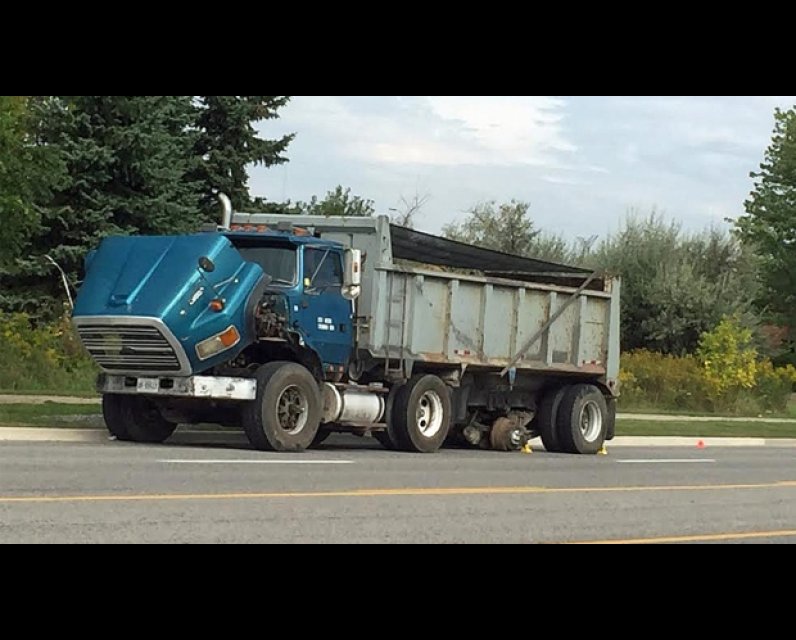Unpublished Opinions
Ray Gompf was born in Hamilton, Ontario in 1943 into a family that has been in Canada since the 1780’s. Ray was educated in Dunnville and Hamilton, Ontario. He entered the Royal Canadian Army Service Corps in 1961. He remained in the service of Her Majesty until 1973. Now retired, Ray was a long haul trucker and businessman in the trucking industry for the remainder of his career. There is not a spot in the United States or Canada that is unfamiliar to Ray.
Active in his beloved community of Britannia in Ottawa's west end, Ray was a founder of the Lighthouse Program, a program that opened the school after hours to a host of community activities, in the Regina Street Public School. He later chaired the committee that created a school feeding program to help underprivileged children start the learning day with a nutritious breakfast. In addition, Ray was instrumental in the creation of the first Neighborhood Watch program in the world.
Wheel offs don't have to happen

By G. Ray Gompf, CD
The recent TruckWorld truck show in Mississauga is always the place to see new products and services that are necessary and if not necessary are products and services that one should not do without.
One new product that sprang to attention was at the LUG LOK booth. The idea isn't really new. It's the application that's new. Dave Golightly, a tire guy from Kingston, Ontario took this idea and has run with it.
With the LUG LOK, there is absolutely no possible way for lug nuts to come loose. There is a myriad of products out there to give a driver an indication that something is wrong if the driver is attentive enough but except for this concept nothing will prevent lug nuts coming loose.
While warning devices may be nice -- it's those ideas that absolutely prevent disaster that are most meaningful. Golightly's idea is one of those things that absolutely prevents disaster and it isn't expensive, probably not much more than the ideas that simply warn of pending disaster.
Now, this product will only prevent the lug nuts from ever coming off. It will not prevent the failure of the lug itself. It will not prevent failures that the driver cannot monitor. Essentially, if the problem is deeper than the driver's ability to inspect there could be issues, but let's face it, it's the lug nuts that come loose and cause the overwhelming majority of problems; the deeper issues are few and far between, if ever.
The problem with wheel offs is there are so many people in the repair, maintenance, inspection chain that even if one individual fails to uphold his or her part of the process, then failure could be a reality and fault always comes back, ultimately, to the driver.
Tire people are supposed to be trained to follow precise procedures and for the most part they do follow those procedures; but some take short cuts and those shortcuts will invariably come back to haunt someone, usually the poor sap driver who wasn't aware of the short cut takes the blame.
Drivers are trained to do an inspection at every opportunity. There is the pre-trip inspection. But the problem with the pre-trip mentality is that if the trip is a long one, they may slough off a few of those subsequent daily inspections. They KNOW the truck so tend to be less than precise or thorough in their inspections or at least that's the mentality. If every daily vehicle inspection was done with the thoroughness required, there would never be any problems with vehicles. Problems would be identified and addressed immediately. There will always be that one dispatcher who will try to encourage the driver to "limp home and we'll fix it here". The thing with the driver doing daily vehicle inspections is the maintenance department may not get all the information from the driver and things that could have been prevented aren't.
One of the other problems is that if the company has each of it's terminals as individual site cost recovery or individual revenue stream, then one branch is going to try to slough off their costs to another branch.
While training helps considerably, it's often a problem created by the accounting department and competition amongst various terminals to keep from coming under the scrutiny of in house auditors.
“One of the disappointing things I hear from instructors is they train them and they go back to the workplace and fall back under old habits again,” VanderZwaag said. “Training is one part of it but having them rigorously follow those procedures is what makes the program successful.”
Dave McDonald, commercial sales manager, Northern Ontario with Bridgestone, said "one of the biggest mistakes wheel installers make is not using lubrication." McDonald is quite correct. Dry fitting can lead to the lug nuts being over torqued. Once the lug nut is over torqued, the torque wrench is going to tell the operator it's torqued at not less than the prescribed number. Instead, the torque wrench should be adding on the last few foot pounds of torque required.
Wheel nut studs should never be used a second time and this is one area where the accounting people will say, save money, so the studs get used over and over. These studs are constantly under heavy stress and while they don't fail often, they can be stretched, over torqued and shear metal fatigue can take it's toll. By changing studs every time the lug nuts are removed then the change of stud failure is minimized.
By changing the lug nuts each time, that also prevents the stretching of the threads on the Lug nuts.
When studs and nuts changed when they are separated on purpose, the whole business of equipment failure is virtually eliminated and the costs are so small, it's almost senseless to reuse the studs or nuts. Now, when changes have to be made on the road, it may not be practical to replace and the reuse may be necessary. The thing is that when a reuse has to be necessary, those reused items must be replaced during normal and regular preventive maintenance exercises.
Dave Golightly at LUG LOX has prevented even the need for re-torquing after a wheel change.
Take a good look at LUG LOX. It's simple. It's not expensive. It's effective. This product makes life safe for everyone. WWW.LUGLOXCANADA.COM



Comments
Be the first to comment